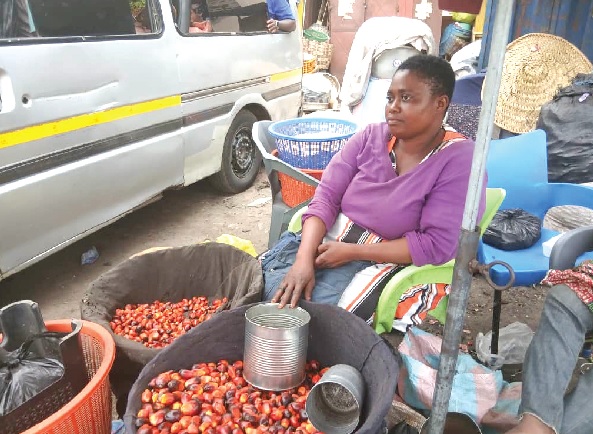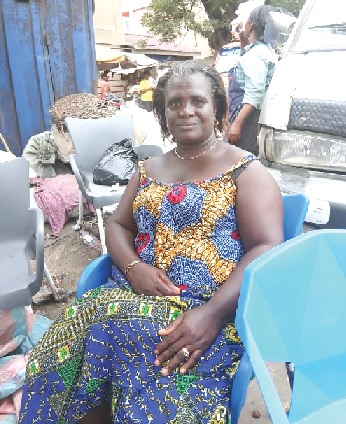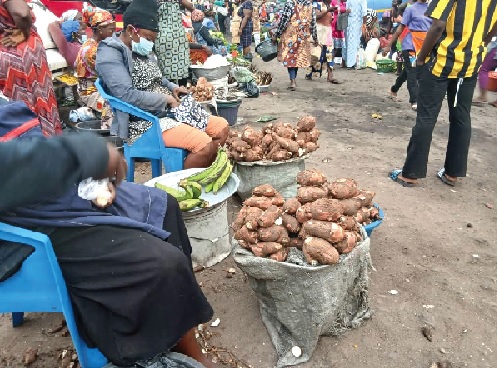For the past seven months, cassava sellers at the CMB Market in the Central Business District of Accra have experienced low sales, leaving many of them with bags of unsold cassava.
Sellers from various parts of the city, who frequent the market to buy on a wholesale basis, said many families were no longer eating fufu as they used to.
This disruption in sales was revealed during three days of interaction between The Mirror and some cassava traders at the CMB market, starting last Wednesday.
Fufu is a Ghanaian delicacy from boiled and pounded starchy foods such as cassava and plantains.
According to a trader, Madam Sophia Adjei, many families have resorted to low-cost meals such as a popular rice meal, angwamo, to cut costs and save towards their children's high school education.
A trader at the CMB market, Josephine Addai, said it costs more than GH¢200 to prepare fufu for the family, " And so if you are preparing fufu thrice a week at home, how will you be able to save to buy the items on your child's prospectus?".
Effect of low sales
The low sales have left many of these sellers in the market in a difficult situation. " We are losing our money, we have to throw away our cassava. After three days, if we cannot sell, we give them out to those rearing cows to feed them," one of the sellers, Madam Lareba Azizz, told The Mirror.
Some traders who have sold cassava for over 50 years bring cassava from various destinations in the country into the CMB market, making the market a hub for cassava and all kinds of foodstuff.

Cassava is brought into the market from Tuobodom, Takoradi, Akomadan, Kimtampo, New Edubiase, Suhum and Obuasi.
At the CMB market, many cassava traders “lobbied” potential buyers to buy cassava. In contrast, others sat and chat while waiting for food waste collectors to hand over their unsold sacks of cassava, which had gone bad after days.
Big price reduction
One of the CMB market's big cassava traders, who had sold the produce for over 50 years, said she brings in trucks of cassava from all over the country.
Mrs Rebecca Boye, popularly known in the market as CMB apuskeleke, said a sack of cassava sold between GH¢500 and Gh¢250, depending on the size, was now sold at GH¢100.
"And this is because they are not buying, so you must reduce the price. We buy them at Gh¢300 in the villages, and then you bring them to Accra, and you are forced to sell at Gh¢100 because they will go to waste. Are you not running at a loss?
For the past seven months, people have not been buying cassava. Cassava is in abundance in the market, and it is going to waste, so we send it to herdsmen to feed cows, " she explained.
CMB Apuskeleke said she brought in 100 bags of cassava last Wednesday from Akomadan, pointing to this reporter, some of the cassava she had to give to food waste collectors.

She explained passionately that the business had affected her mood, and was therefore taking a break.
She also pointed out that the nature of the cassava business was such that ideally, they should be sold in a day, so it becomes a problem when sales lasted for four days.
However, she said they were hopeful that business would be better after the rainy season.
Way forward
A palm nut fruit vendor, Madam Grace Banson, who is also the Aduana queenmother at Akyem Mmofram in the Eastern Region and known in the CMB market as Ohemaa, shared her concerns.
"The way forward for this food waste is for the government to set up gari processing factories near the market and not in the villages. The unsold cassava can be sent to the factory and made into gari. Gari, when preserved well, can last over a year. That way, we will not waste cassava in this market. Factories should be built for all seasonal foods such as palm nuts, tomatoes, plantain, garden eggs and yams," she said.
CMB market queen
The CMB market queen, Naa Kwanoa, also told The Mirror that last Wednesday, they had to dispose of 20 sacks of cassava because they had gone waste.
She said she had told the cassava sellers to reduce the price to avoid more of their cassava going bad.
"It is the abundance of food that is why many are not buying cassava, and in Ghana, when food is abundant, we cannot store some. Every food season is now, and it has become a challenge’’, she said.
Low fufu sales
Naa Kwanoa, who also operated a chop bar at the market, noted that the low cassava sales had also affected fufu sales, explaining that many people were buying banku instead of fufu.
"Plantain is in season, yams as well, and so with GH¢10, people can buy fufu, but it comes with an additional cost of buying meat. So the person will purchase banku and collect just soup or boiled yams with garden egg stew.
During a check in the market, The Mirror noted some foodstuff were in abundance, sweet potato, yams, pepper, plantain, cassava, nkontomire, cabbage, okro, garden eggs and spring onions.
One large cabbage was selling for GH¢7; and four pieces went for GH¢10, a basket of pepper was selling at Gh¢30, 30 pieces of garden eggs going for GH¢5, 20 pieces of okra sold at GH¢5, 10 pieces of cassava sold at GH¢5, seven small fingers of plantain sold at GH¢5, while two medium size sold at GH¢5 and four medium size went for GH¢10.
Writer’s email address: lydiaezit@gmail.com

